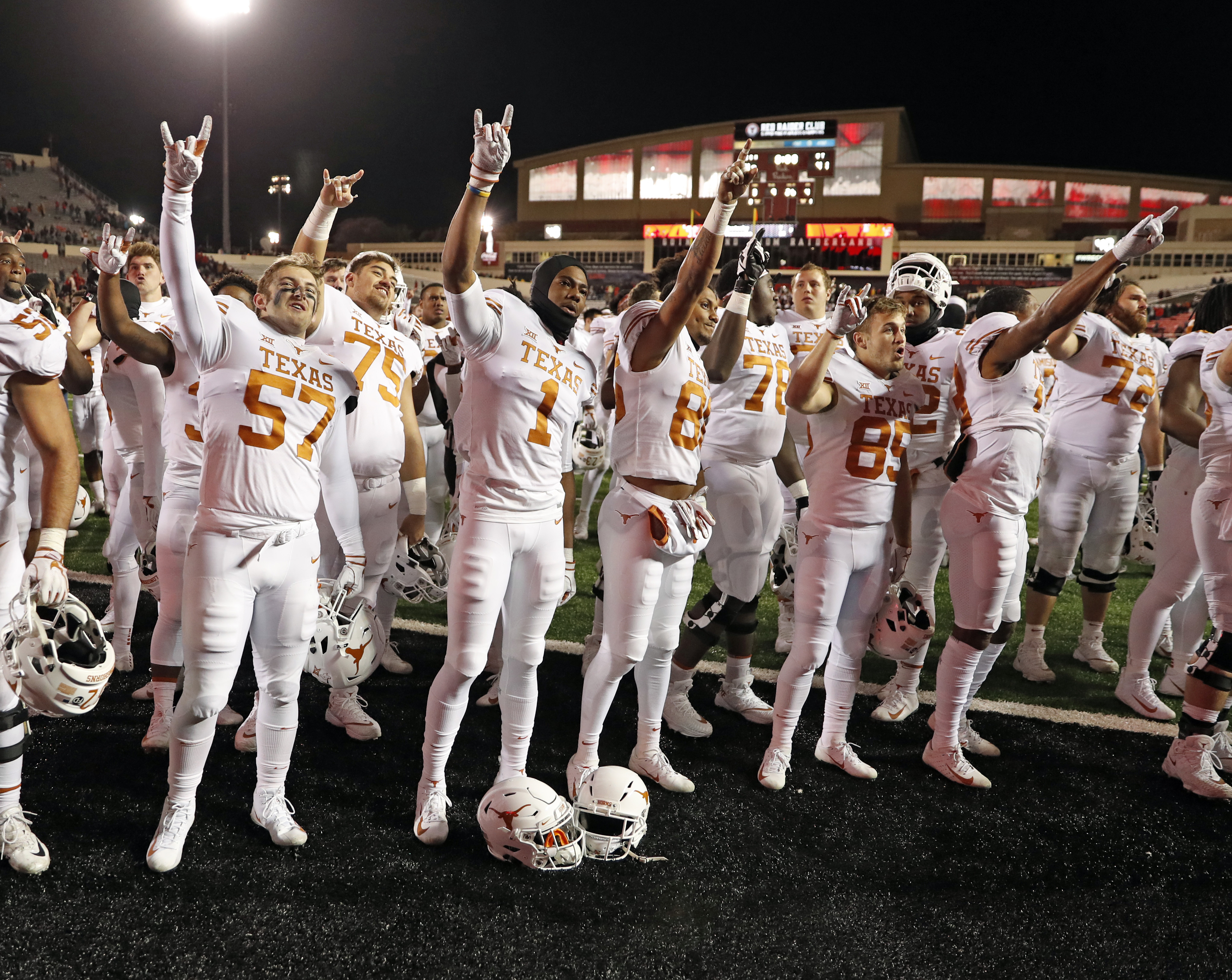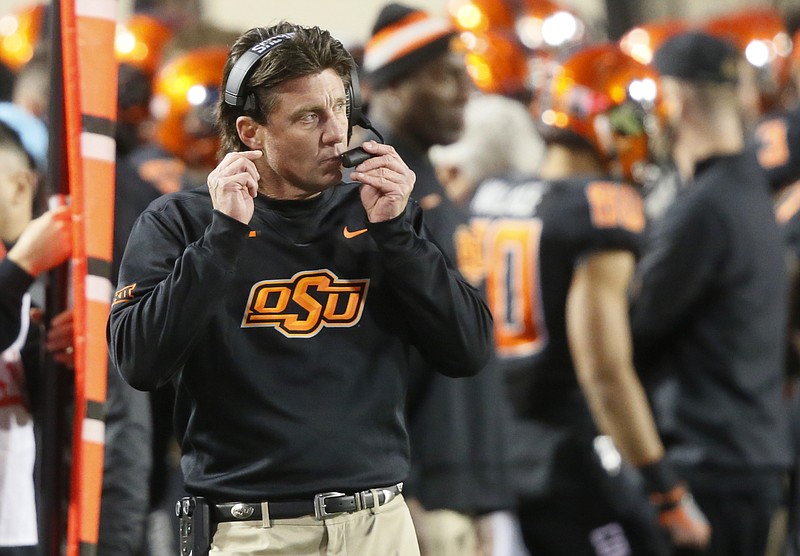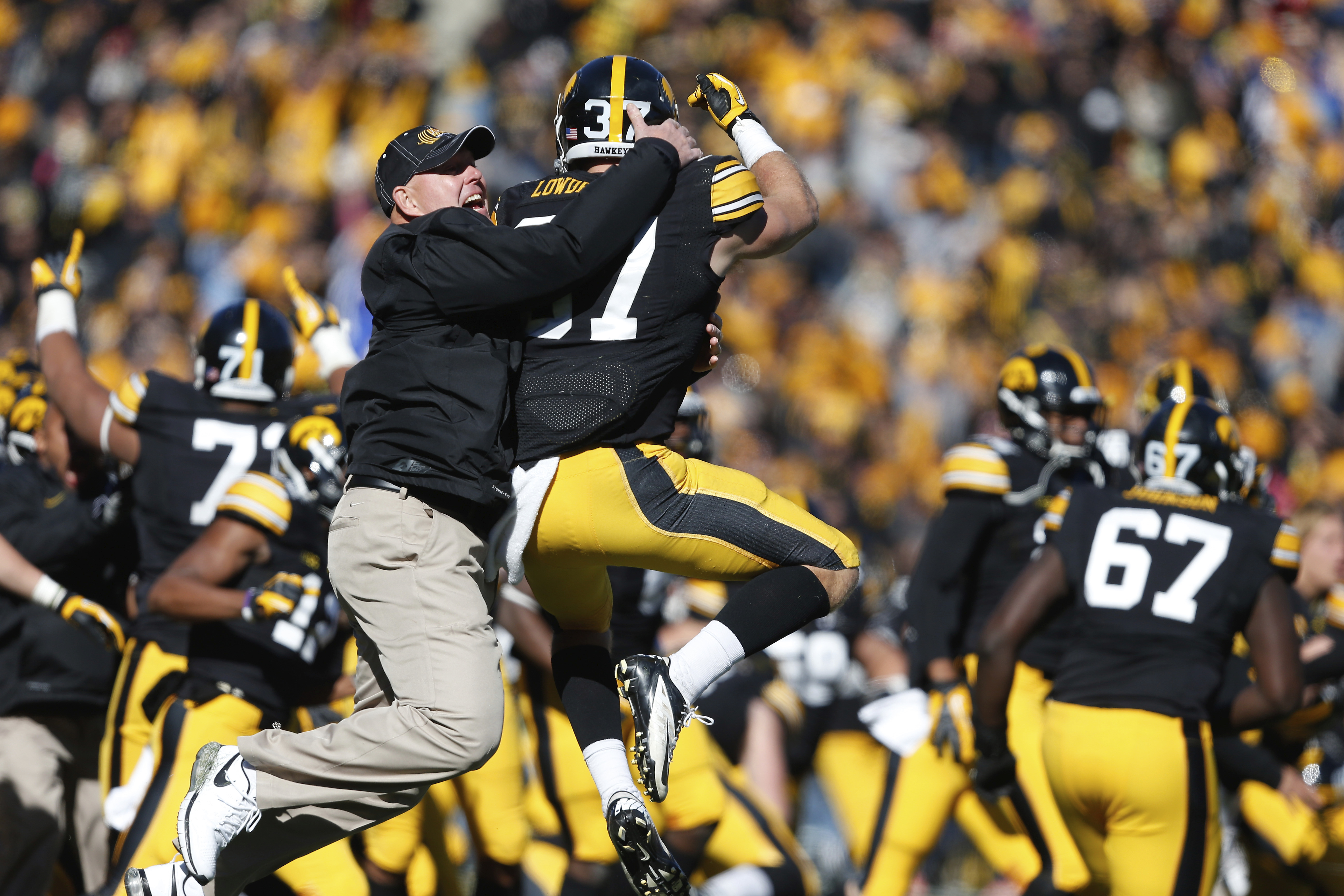OKLAHOMA CITY - One day after Oklahoma State running back Chuba Hubbard lashed out at coach Mike Gundy on social media for wearing a T-shirt promoting a far-right news channel, Gundy apologized.
Hubbard, who is black, suggested Monday he may boycott the program after Gundy was photographed wearing a T-shirt promoting the One America News Network, a cable channel and website that has been critical of the Black Lives Matter movement and praised by President Donald Trump.
On Monday evening, Hubbard and Gundy appeared in a video together, with Gundy saying he would make changes. Gundy, who is white, took it a step further on Tuesday.
"Our players expressed their feelings as individuals and as team members. They helped me see, through their eyes, how the T-shirt affected their hearts," Gundy said. "Once I learned how that network felt about Black Lives Matter, I was disgusted and knew it was completely unacceptable to me. I want to apologize to all members of our team, former players and their families for the pain and discomfort that has been caused over the last two days. Black lives matter to me. Our players matter to me."
Gundy was seen in a photograph on Twitter wearing the shirt with the letters OAN. Hubbard responded and said: "I will not stand for this. This is completely insensitive to everything going on in society, and it's unacceptable. I will not be doing anything with Oklahoma State until things CHANGE."
Hubbard's tweet drew support from past and present Oklahoma State players. The school's president and athletic director issued statements supporting black athletes, condemning insensitive behavior and voicing concern about the responses to the tweet without directly calling out Gundy.
Hubbard has been more active on social media since George Floyd, an unarmed black man, died after a white Minneapolis police officer pressed his knee against Floyd's neck for several minutes.
Gundy also apologized in April after a media session in which he called the coronavirus the "Chinese virus."
Last season, Hubbard, who is from Canada, was a first-team All-American and the AP Big 12 offensive player of the year. He ran for 2,094 yards, the second-best single-season rushing total in school history, and finished eighth in the Heisman Trophy balloting. He was eligible for the NFL draft but chose to return to school.
Iowa fires strength coach
IOWA CITY, Iowa - University of Iowa athletic director Gary Barta has given a vote of confidence to longtime football coach Kirk Ferentz after deciding to cut ties with a strength coach accused of mistreating African American players.
Ferentz has dealt seriously in addressing former and current players' concerns about the program's culture, Barta said. He also pointed to Ferentz's on-field success, player development and the team's record of community service.
"I do remain confident Kirk Ferentz can lead this team moving forward and many of the attributes we're all familiar with over the last 20 years are still there and still a part of the foundation and who Kirk is," Barta said at a news conference.
Iowa announced a separation agreement Monday with Chris Doyle, at the center of allegations he and other assistant coaches made racist comments and belittled players. Doyle will be paid more than $1.1 million by the university, which also said a Missouri law firm, Husch Blackwell, will conduct an independent review of the allegations against the football program.
"I have worked diligently to make a positive impact on the lives of student-athletes, support them as they speak out, and look forward to continued growth," Doyle said in a prepared statement. "I am confident that my record and character will be confirmed in the course of the independent review. The university and I have reached an agreement and it is time to move on from Iowa football. My family and I are looking forward to the next chapter."
Doyle, who earned $800,000 per year and was the highest paid strength and conditioning coach in college football, has denied any "unethical behavior or bias" based on race. Under the agreement, Doyle will be paid 15 months' salary and for unused vacation. There will be two payments of $556,249.50 - the first on Aug. 1 and the second on Jan. 1. Doyle agreed not to take any legal action against the university, the board of regents or state of Iowa.
Ferentz is Iowa's all-time wins leader and enters his 22nd season with the longest active tenure among Football Bowl Subdivision head coaches. Ferentz earned $5.5 million last year after bonuses, and his contract runs through the 2025 season.
Barta became emotional during the news conference, choking up on two occasions he mentioned race relations in his athletic department and in the United States.
"One thing I wanted to do, and it's really important to me, is to say I'm sorry to former student-athletes, coaches, staff, current student-athletes, anybody who has had a negative experience with Iowa football," Barta said. "When I say negative - if you felt mistreated, misled, discriminated against, whatever the case, I truly am sorry. We want everybody who participates in our program to have a great experience academically, athletically and socially."
Former Iowa offensive lineman James Daniels, now with the NFL's Chicago Bears, was the first to raise the issue of the Iowa staff's treatment of players.
"There are too many racial disparities in the Iowa football program. Black players have been treated unfairly for far too long," Daniels wrote June 5 on Twitter.
Dozens of former players followed with social media posts about their experiences, especially with Doyle. He was placed on paid leave June 6. Offensive coordinator Brian Ferentz, son of the head coach, and assistant defensive coordinator Seth Wallace also have been alleged to have made inappropriate comments to players.
Kirk Ferentz said Friday the coaching style by some of his assistants "at times was demeaning and created unnecessary frustration and anxiety."
Barta said Iowa's efforts to address racial issues started two years ago when a review showed black male athletes were graduating at a rate lower than that of their white peers.
A diversity task force was created to explore reasons for the disparity, and a report indicated many black athletes felt uncomfortable. Barta said anonymous interviews produced comments such as "I felt like I had to put a mask on and check my identity at the door" and "I was told by my coach to change my hairstyle because it didn't fit the Iowa culture."
Barta noted steps that were taken in response. Former football player Broderick Binns was named interim director of diversity, equity and inclusion for the athletic department. Ferentz began having a regular dialogue with black athletes about their concerns. A consulting group was brought in to counsel black athletes about where they could turn if they don't think their concerns were adequately addressed.
"I had convinced myself we were doing enough," Barta said. "Frankly, the last few weeks have been a wakeup call."
 AP photo by Brad Tollefson / University of Texas football players sing "The Eyes of Texas" after road game against Texas Tech on Nov. 10, 2018, in Lubbock. A group of UT student-athletes has urged the school to rename several campus buildings, change the traditional school song and donate a percentage of athletic department revenue to organizations supporting the Black Lives Matter movement.
AP photo by Brad Tollefson / University of Texas football players sing "The Eyes of Texas" after road game against Texas Tech on Nov. 10, 2018, in Lubbock. A group of UT student-athletes has urged the school to rename several campus buildings, change the traditional school song and donate a percentage of athletic department revenue to organizations supporting the Black Lives Matter movement.Texas to talk with athletes
AUSTIN, Texas - The interim president of the University of Texas said he is scheduling meetings with student groups after dozens of Longhorns student-athletes said they wanted the school to ditch "The Eyes of Texas" song and rename several campus buildings.
The athletes said last week they won't help the school recruit future athletes and won't participate in alumni events as they typically do. They said they will continue with team activities leading up to the fall semester, but they didn't say what they will do once school starts.
"I have heard from many students, alumni, faculty and staff asking for meaningful changes to promote diversity and equity and ensure that black students at UT are fully supported. It is important, first, for me to listen closely - and then to work with the entire community to develop a plan to move the university forward," interim president Jay Hartzell said in a release.
The statement did not address any of the specific concerns raised by the students.
Some other campuses have moved since George Floyd's death to strip the names of historical figures associated with slavery and racism, including Clemson University, which took the name of former vice president and slavery proponent John C. Calhoun off its honors college. The move was supported by alumni and NFL players DeAndre Hopkins and Deshaun Watson.
Hartzell said he'll meet this summer with leaders of black student organizations, student-athletes and other students and community members.
"Working together, we will create a plan this summer to address these issues, do better for our students and help overcome racism," Hartzell said.
The athletes issued an unsigned, two-page statement last week requesting the school rename several campus buildings named after school officials with ties to its segregationist past. They also said the school should stop using "The Eyes of Texas," which has long been criticized for its connection to minstrel shows with characters in blackface in the early 1900s. It is regularly sung at nearly every organized campus event and players in all sports gather as team to sing it after every game.
Other demands include naming part of the football stadium after Julius Whittier, Texas' first black varsity football player, and donating some of the athletic department's annual revenue to Black Lives Matter and other organizations that fight racial injustice.
Texas has previously attempted to address Confederate figures and racist policies in its history. In 2010, the school removed the name of a former Ku Klux Klan leader from a dormitory, and in 2015 it removed a statue of Confederate president Jefferson Davis. In 2017, the school removed several more statutes of Confederate figures, including Gen. Robert E. Lee.

